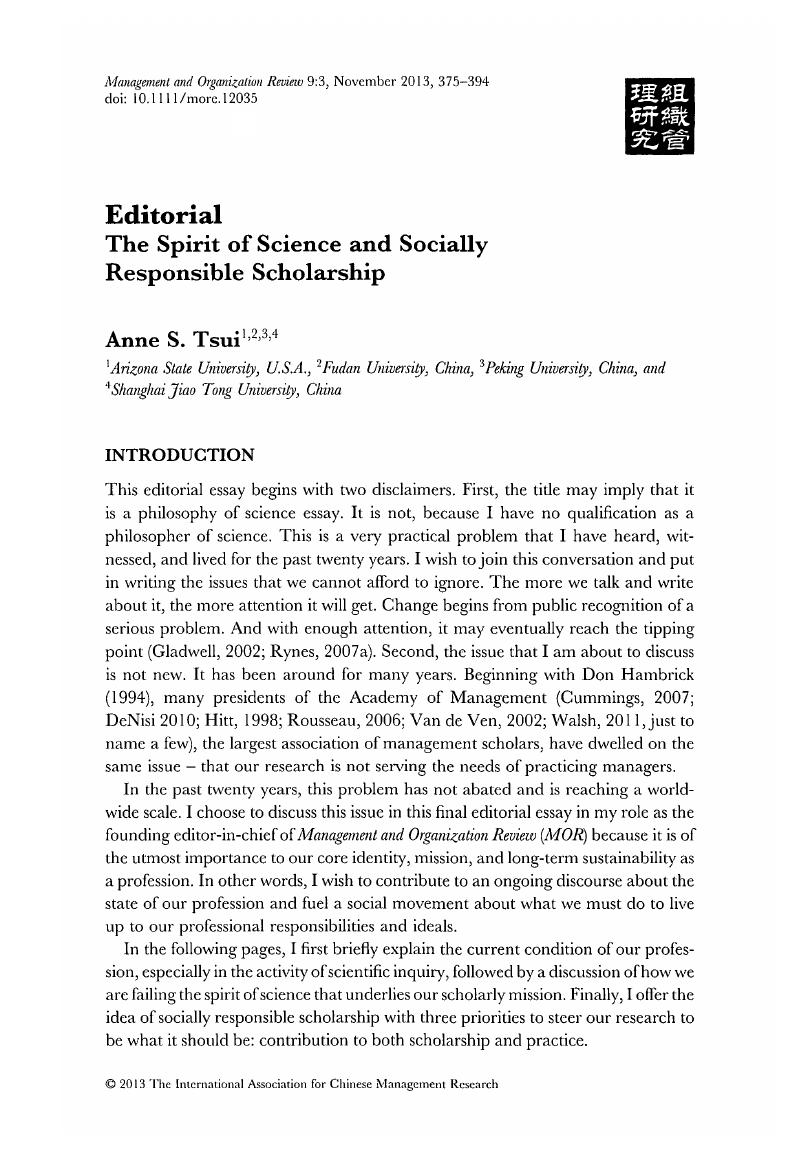Crossref Citations
This article has been cited by the following publications. This list is generated based on data provided by Crossref.
Bartunek, Jean Marie
and
Rynes, Sara Lynn
2014.
Academics and Practitioners Are Alike and Unlike.
Journal of Management,
Vol. 40,
Issue. 5,
p.
1181.
DeNisi, Angelo
and
Smith, Caitlin E.
2014.
Performance Appraisal, Performance Management, and Firm-Level Performance: A Review, a Proposed Model, and New Directions for Future Research.
Academy of Management Annals,
Vol. 8,
Issue. 1,
p.
127.
Schwarz, Gavin
and
Stensaker, Inger
2014.
Time to Take Off the Theoretical Straightjacket and (Re-)Introduce Phenomenon-Driven Research.
The Journal of Applied Behavioral Science,
Vol. 50,
Issue. 4,
p.
478.
Thompson, Cassandra
and
Lane, Samuel
2014.
Intelligence and job satisfaction in the USA and China.
Journal of Technology Management in China,
Vol. 9,
Issue. 3,
p.
232.
DeNisi, Angelo
and
Smith, Caitlin E.
2014.
Performance Appraisal, Performance Management, and Firm-Level Performance: A Review, a Proposed Model, and New Directions for Future Research.
Academy of Management Annals,
Vol. 8,
Issue. 1,
p.
127.
Lewin, Arie Y.
2014.
The Peer-review Process: The Good, the Bad, the Ugly, and the Extraordinary.
Management and Organization Review,
Vol. 10,
Issue. 2,
p.
167.
Aguinis, Herman
Shapiro, Debra L.
Antonacopoulou, Elena P.
and
Cummings, Thomas G.
2014.
Scholarly Impact: A Pluralist Conceptualization.
Academy of Management Learning & Education,
Vol. 13,
Issue. 4,
p.
623.
Lewin, Arie Y.
2014.
The Peer-review Process: The Good, the Bad, the Ugly, and the Extraordinary.
Management and Organization Review,
Vol. 10,
Issue. 2,
p.
167.
Vázquez, Xosé H.
2015.
Taking stock, looking ahead.
BRQ Business Research Quarterly,
Vol. 18,
Issue. 1,
p.
1.
Donaldson, Thomas
and
Walsh, James P.
2015.
Toward a theory of business.
Research in Organizational Behavior,
Vol. 35,
Issue. ,
p.
181.
Barkema, Harry G.
Chen, Xiao-Ping
George, Gerard
Luo, Yadong
and
Tsui, Anne S.
2015.
West Meets East: New Concepts and Theories.
Academy of Management Journal,
Vol. 58,
Issue. 2,
p.
460.
George, Gerard
2015.
Expanding Context to Redefine Theories: Africa in Management Research.
Management and Organization Review,
Vol. 11,
Issue. 1,
p.
5.
Marquis, Chris
Jackson, Susan E.
and
Li, Yuan
2015.
Building Sustainable Organizations in China.
Management and Organization Review,
Vol. 11,
Issue. 3,
p.
427.
Ferraro, Fabrizio
Etzion, Dror
and
Gehman, Joel
2015.
Tackling Grand Challenges Pragmatically: Robust Action Revisited.
Organization Studies,
Vol. 36,
Issue. 3,
p.
363.
Persson, Sybille
and
Wasieleski, David
2015.
The seasons of the psychological contract: Overcoming the silent transformations of the employer–employee relationship.
Human Resource Management Review,
Vol. 25,
Issue. 4,
p.
368.
Persson, Sybille
and
Shrivastava, Paul
2016.
Sustainable Development of Human Resources Inspired by Chinese Philosophies: A Repositioning Based on François Jullien's Works.
Management and Organization Review,
Vol. 12,
Issue. 3,
p.
503.
Sheldon, Peter
and
Sanders, Karin
2016.
Contextualizing HRM in China: differences within the country.
The International Journal of Human Resource Management,
Vol. 27,
Issue. 18,
p.
2017.
Bosco, Frank A.
Aguinis, Herman
Field, James G.
Pierce, Charles A.
and
Dalton, Dan R.
2016.
HARKing's Threat to Organizational Research: Evidence From Primary and Meta‐Analytic Sources.
Personnel Psychology,
Vol. 69,
Issue. 3,
p.
709.
Tsui, Anne
2016.
Reflections on the so-called value-free ideal.
Cross Cultural & Strategic Management,
Vol. 23,
Issue. 1,
p.
4.
Agostini, Bertrand
Persson, Sybille
and
Shrivastava, Paul
2016.
“I got the business blues”: what organizations can learn from popular music?.
Journal of Cleaner Production,
Vol. 135,
Issue. ,
p.
1524.



